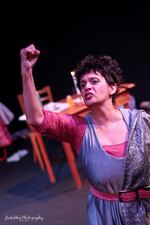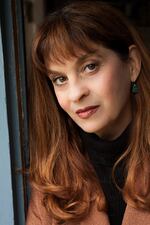
A scene from "Not My Revolution".
Courtesy of Elizabeth Huffman.
Living as a displaced person may have less to do with the country stamped on your passport, and more to do with living hand-in-glove with loss.
This weekend, theater artist Elizabeth Huffman, who specializes in works exploring global problems, directs a staged reading of a play called "At the Periphery," by the Turkish playwright Sedef Ecer, as part of BOOM Arts Global Voices Lab: International Plays in Translation. Huffman is a Syrian-American director and actress living in Portland.
Q&A with Elizabeth Huffman
April Baer: Were you familiar with Sedef Ecer before taking this on?
Elizabeth Huffman: No, but it's a very unique play. The play deals with people who live on the margins of society. Then while she never really stays on the particular locale. You could look at it as a refugee camp; you could look at it as a homeless camp, where these people have makeshift homes, and they live on a garbage heap that they think it is beautiful.
Baer: Do you sense that the playwright left the location for this play ambiguous as an intentional choice?

Huffman, whose maternal grandparents emigrated from Syria to Western Pennsylvania in the 1920s.
Courtesy of Elizabeth Huffman.
Huffman: I absolutely do. I think she wanted to say that this could happen to anybody; this is universal. If we could go up to [the southeast neighborhood of] Lents here in Portland and see the communities of a lot of people have been made homeless by their displacement, and not being able to afford the rents in the rising cost of living here in Portland, and other reasons as well.
Baer: You recently had the experience of a front row seat the refugee crisis in Europe, in Germany touring a one-woman show, “Not My Revolution.”
Huffman: Yes. My character is a displaced, formerly very wealthy Syrian refugee, and I also play Marie Antoinette, and those two intersect a very unusual way. The first 10 minutes of my play are in total silence, as you watch my character enter into a squat in Istanbul, and how she sets up her makeshift home. A woman who was a refugee [who came to see the show] said, "I don't know how you did it, but that mess that was on stage is what's going on inside my head, and my heart. And I do exactly the same thing. I clean constantly. I had a beautiful life in Syria, I had a beautiful home. I lost everything. And that is how I hold onto my sanity."
Baer: The story juxtaposes a narrative of this woman who used to be an upper middle-class person in Syria, on the run, and all alone in a deserted building in Istanbul, and she’s reading a play about Marie Antoinette. What did you feel these two women had to offer each other?
Huffman: Well, they have both been judged by the men in the world. They are victims of a brutal civil war, bloody revolutions, both of them. They both lost everything. And they were both in a class that you would not expect to have found themselves in that position. I actually begin the play by coming into the lobby with all of my belongings. And I asked various members of the audience to help me find a clean women's shelter. I'm speaking in several different languages to try to communicate.
Baer: The audience does not necessarily realize that you are the main character of the place you're doing this. What was the audience reaction like?.
Huffman: It was shocking. There were people minute I came up to them that yelled at me and said, "I don't have anything, leave me alone." And I was shocked and humiliated, embarrassed, terribly shy, frightened. There were other people to try to understand, try to help, but in the end had to give up, because they did not know how to communicate with me. I followed the audience in, and ended up in the theater sitting in the first row, and the people next to me were shrinking away from me, I had no idea that I was a part of the play, until the lights go down, and I end up going up on the stage, and imagine their surprise, especially the people who were unkind.
Baer: Did audience members during the talk-back say what they had been feeling?
Huffman: That was, possibly, the most profound thing I experienced on this to work. And it made me feel that I need to do this play all over the world. One of the women who was most unkind to me stayed for the talk-back, and she stood up and said to everyone, "I am so ashamed. I am ashamed of the way I spoke to you, I will never do that again. I never took into consideration the way the homeless or the refugees would be feeling. We're dealing with it every day here, and I had made up my mind that they were an imposition on my country, and I never saw the human." And that's why I do theater.
Elizabeth Huffman hopes to stage workshop performances of “Not My Revolution” in Portland at some point, and produce it in other cities later this year. One production is already planned in New Mexico.
She’s directing “At the Periphery” as part of BOOM Arts Global Voices Lab — one show only — Saturday, Feb. 4 at 4:30 p.m. at Portland State’s Lincoln Hall. Performances of several other plays in Global Voices continue next weekend.
Click play in the audio player above above to hear more on her family's immigrant experience.

